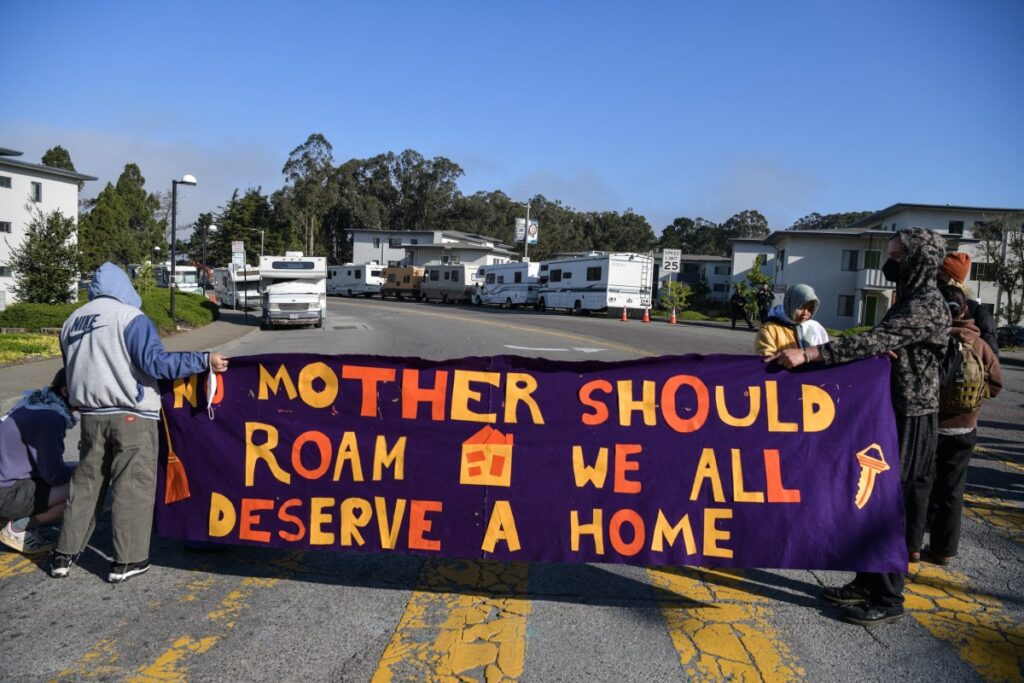When I work with vulnerable populations at risk of further marginalization, I often don’t have answers to people’s pressing questions. When RV residents ask whether or not they will be able to stay in their homes for another year, it feels almost irresponsible to answer without concrete information.
I’ve spent the last three months knocking on RV doors, trying to give RV residents access to local government and warn them of just how little the city has to offer. Every conversation usually ends with questions about how to receive a permit, a natural one for someone about to lose their home.
For Latinx residents, the prospect of losing one’s home at a time when private space is essential to avoiding contact with immigration enforcement is particularly cruel.

RV residents have repeatedly expressed their fear, uncertainty, and anger at being forced into instability. They fear their children taking on the burden of finding safe shelter, losing their belongings, and being subject to immigration and law enforcement for being visibly unhoused and Latinx.
The oversize vehicle refuge permit program, which the city espoused as a “compassionate and humane” approach to vehicular homelessness, exempts RV residents who were counted in city limits between May 22 and May 25 from enforcement of the two-hour parking limit for up to one year. From the beginning, the construction of the permit program ignored the realities and needs of RV residents, who were never consulted in the creation of the permit or accompanying legislation. The permit does not allow people who were not counted initially to appeal, despite the short time frame of the city’s count. Facing constant enforcement from the San Francisco Municipal Transportation Agency and the SF Police Department, RV residents constantly move around, making them difficult to locate and contact. Granting an appeals process that gives RV residents who were missed in the count the opportunity to keep their homes and avoid being pushed onto the street without any services is the least the city can do if it professes to “lead with compassion.”
The permit program also includes a nebulous Good Neighbor Policy that dictates public health and safety guidelines for RV residents. Without safe parking sites, power hookups and publicly available waste disposal facilities, most RV residents are left with few options. Housed residents also see RV hotspots as opportunities to dump and litter, leaving RV residents with the responsibility of cleaning up after everyone, at risk of being punished.
The current policy lacks even a draft of the Good Neighbor Policy and clarity on the procedure for revoking permits. The SFMTA Board could give RV residents leniency when it comes to violations of the Good Neighbor Policy. The board should require solid proof of repeated violations, and dictate that permits only be revoked in serious issues of life and safety, creating more safeguards to prevent RV residents from ending up on the street.
These changes are vital to the RV plan; they soften the blow of a short-sighted and half-baked plan that will overload the city’s already strained homelessness system and endanger hundreds of vulnerable individuals. A permit that is truly dignified and compassionate is a form of harm reduction, both for those in RVs who will get to keep a stable situation for longer, and those on the street who will be able to access services faster.
Members of the Board of Supervisors are requesting amendments when they hear the policy after they return in September. Mayor Daniel Lurie’s Office is attempting to prevent the SFMTA from making these crucial amendments.
We all condemn the centralization of power on the federal level, yet we encourage it in our own city when it comes to eliminating visible poverty. Good policy does not come from circumventing legislative processes in favor of surface-level results—it requires community input and revisions. There’s no shame in producing an imperfect policy, and the most humane and compassionate thing the mayor’s office can do is cop to the plan’s flaws and assist in remedying them.
The Mayor’s Office should not have ultimate authority on the final form of all public policy in San Francisco, particularly when the Board of Supervisors has already recommended and passed amendments. The mayor’s office has the power to preserve San Francisco’s legislative process by sending the permit program back to the SFMTA Board. It owes that to its vehicularly housed constituents as much it does to structurally housed ones.
Charlie Fisch (they/he) is an intern at the Coalition on Homelessness, the San Francisco-based homeless advocacy organization that publishes Street Sheet.





